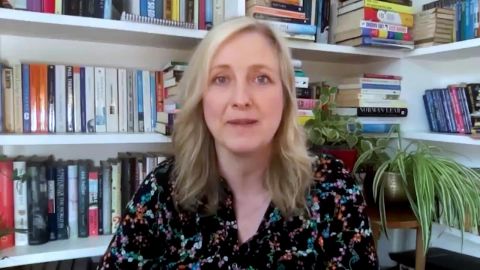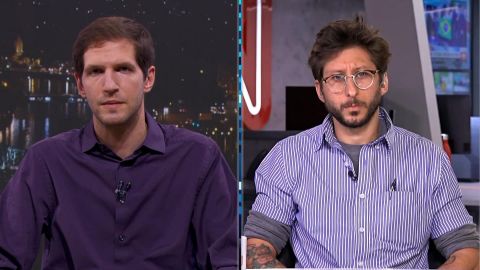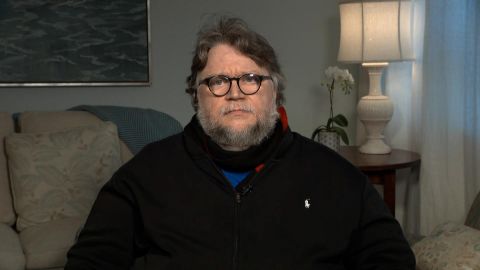Read Transcript EXPAND
CHRISTIANE AMANPOUR: But our next guest says trying to ban that information is like trying to ban oxygen. Carole Cadwalladr is a Pulitzer-nominated journalist for “The Guardian,” and she’s the one who expose the harvesting of personal Facebook data for political campaigns in 2016, which was known as the Cambridge Analytica scandal. And she’s speaking to Hari Sreenivasan about Putin’s information war on Ukraine and on the West.
(BEGIN VIDEOTAPE)
HARI SREENIVASAN, CORRESPONDENT: Christiane, thanks. Carole Cadwalladr, thanks for joining us. You wrote recently that Vladimir Putin has lost the social media war, so to speak. Explain.
CAROLE CADWALLADR, INVESTIGATIVE JOURNALIST: Well, I think he’s been — for years, we have thought of Putin, Vladimir Putin, as being the master of the dark arts of disinformation. And that’s because, for years, he was able to operate in darkness inside the sort of social media platforms. And what’s happened now is that there’s this sort of — he’s burst into the light. And we see him doing these extraordinary moves, which is something which Stalin might have done. There’s no nuance to this. There’s no subtlety. He’s shutting down Facebook. He’s criminalized journalism. Today, we have learned that he’s — they’re looking to make Instagram and WhatsApp — they’re calling them extremist organizations and looking to ban them. I mean, these are just — they are — they’re the actions of a totalitarian. And I think, in that way, we have seen him completely outclassed by Zelenskyy. His mastery of social media has been amazing. He’s just got this fluency, this lightness, this informality, and it’s working. He’s bringing the people with him. Now, that doesn’t mean to say that Putin is winning in that sense, but I think he’s really been shown up quite substantially in this way.
SREENIVASAN: What’s interesting is, is, underlying these efforts is this notion that you could stop information from spreading in 2022. Now, to be fair, there are millions of Russians who have a very different view of what’s happening in Ukraine than you and I do. But is that even possible?
CADWALLADR: I mean, I think what we’re going to see increasingly is an intergenerational war in Russia. We know that a lot of older people, they do get their news from the television, which is wholly pro-Kremlin propaganda. But I think young people, they have been — I think this thing of banning Instagram is going to have a huge impact, because that’s how young people communicate. WhatsApp and Instagram and, in Russia, some of their social media platforms, this is the air that they breathe. And I think the idea that you can just cut off that flow of information overnight, and people are going to accept it, is — I think they have got a whole other thing coming, I have to say.
SREENIVASAN: One of the things that you also point out is that, while now Americans in the West are waking up to the fact that there was an actual
hot war going on for several years in Ukraine, that, really, a lot of this for Putin started back in 2014 even on the information front.
CADWALLADR: Yes. No, I think that’s exactly it. I think the idea that we’re waking up to Russia invading Ukraine two weeks ago is an absolute myth. And I think to have any hope of, like, understanding and addressing the situation, we have to acknowledge Russia invaded Ukraine in 2014. And I think the bit of the puzzle that we’re failing still to see is that Russia — Russia’s first act in Ukraine was to use information warfare. Before it sent in the troops, it penetrated its social media, its information system, and it spread Russian propaganda to distort reality, to change — to confuse people. And the amazing thing is, exactly the same time that Putin began that in Ukraine, he began that in America and the West. And that has been — we know that in detail because of the FBI’s investigation. It catalogues that. And I think we really have to understand this was a joint military assaults on Ukraine and on the West at the same time.
SREENIVASAN: Do you think Vladimir Putin learned and improved over time between what he figured out from the social media campaigns in Ukraine and how it was used and weaponized in the West, say, before the 2016 election or for the Brexit campaign?
CADWALLADR: I mean, he had — from 2014 to 2016, Vladimir Putin had carte blanche across our entire information system. So, he set up — we know that, in St. Petersburg, he set up the Internet Research Agency, and we know that thousands and thousands of trolls and fake accounts flooded our information system. And I think that’s the thing which has really confused and distracted people, this idea that it wasn’t that — it wasn’t that Putin set out to support Trump or had any political agenda. In 2014, it was about simply spreading confusion, making us more divided, increasing polarization. Just it was divide and rule, if you think of it like that. And from 2014 to 2016, he got away with that in complete darkness. And that is because of the nature of our social media platforms. Because our social media, the Silicon Valley companies — they’re private companies. And even until now, they are closed black boxes. So we had no idea what was going on inside them. And it was really only until — 2016, the FBI started telling us, and then after the U.S. election, journalists and academics slowly and steadily unpicked the truth of what was happening. But we’re in an extraordinary situation, where the social media platforms are the ways that Putin launched this information war against Ukraine and against us. And those same social media companies, they’re still that attack surface. They can still be used in that way.
SREENIVASAN: I wonder if we collectively don’t see the potential harm because we don’t see what we see today in Ukraine, literally rockets flying through the air, bombs dropping? Yet what you’re describing in ’14, ’16, ’20, ’18 had huge societal impact.
CADWALLADR: It did, but it’s just this — it’s this way that we look at things. It’s the way that we frame things. So we use words like election interference or meddling. Russia meddled in the vote. And these words, they minimize it, and they’re not seeing it in the correct context. And the correct context is that this was a military strategy. And it was carried out in many respects by actually military intelligence. It was — the GRU, which is Russian military intelligence, they are the ones who carried out the hack and leak on Hillary’s e-mails, for example. And those GRU — those military intelligence officers, they are — now they’re in the war playing this fundamental part in the role — in the war in Ukraine. And they are — it was GRU officers, for example, who poisoned Sergei Skripal in Britain. And there have been these warning signs. So the poisoning of Sergei Skripal in Britain, I think it’s been — it was seen as a source of — it was a botched assassination attempt. But this was Putin using an unconventional chemical weapon on the streets of Britain, and getting away with it. He got away with it. And that is — I think that’s one of the most frightening things of all, that we just — we haven’t even seen what he’s been — what Vladimir Putin has been doing.
SREENIVASAN: What’s also fascinating is right now you see a lot more journalists, kind of armchair quarterbacks, so to speak, from all over the world that are jumping into open source information and trying to figure out how to verify things in a way that I have never seen in any armed conflict before.
CADWALLADR: Yes. No, so this is completely fascinating. And it’s something which is new and unprecedented again in the war in Ukraine. So, I spoke last week to Eliot Higgins, who’s the founder of Bellingcat, which is one of the pioneers of this open source investigation. And what Bellingcat do is, there’s a combination of professionals, but also armchair investigators all over the world. And what they are doing is, they are — every single photograph and every bit of video footage which is being uploaded onto the Web, there is a battalion of people who are gathering that. they’re verifying it in real time. They’re geolocating it, and then they’re putting it into open source databases and under open source maps. And that’s helping not just journalists in covering the conflict or people on the ground who are trying to under — Ukrainians who need to know what road is safe or where they should go, but also even Ukrainian military intelligence is using this, because it’s giving them this — there’s a global force which is helping them understand the conflict and what the Russians are doing in real time.
SREENIVASAN: Along with investigations into the U.S. elections and Facebook and misinformation, you also had a tremendous amount of reporting around what happened with the Brexit vote. And is there a connection between Russian influence, not just on social media, but trying to influence the direction of that vote in the U.K.?
CADWALLADR: Hari, thank you so much for asking me this question. Because it’s become — it’s such a contested issue in Britain that you can’t even have a discussion around this in public. It’s — you know, this is — it became such a contested political issue that Brexit must be done at all costs. And that made us blind to the bigger political — geopolitical forces, which are going on. And, you know, you’re completely correct. I began investigating this subject in November 2016. And that investigation became — you know, we broke the Cambridge Analytica and Facebook scandal. But all the way through this reporting, we see this really clear line between Brexit, Trump, and Russia. And there is a triangulation there. There is a straight and clear line through multiple individuals and organizations and via the tech platforms. And we can’t — you know, it’s — in Britain, we — you know, we see our politics through this very narrow lens of what’s going on, you know, in Westminster, in parliaments. And I think, you know, the same happens in America, too. You know, the Mueller Report was — it got bogged down into this question of, was — you know, did Trump collude with Russia? And, actually, you know, the big takeaway from the Mueller Report should have been Russia attacked America, it successfully attacked America. This was a military attack, and it got away with it. And that same attack was across the systems, the information systems, which we all use. And that, in that year, 2016, they were completely unprotected. And that is where, in Britain, we’ve been blind to waking up to that. We haven’t even — you have this massive investigation by the FBI, and these congressional committees. In Britain, we have had not one single investigation. There was one report, and Boris Johnson personally tried to suppress that, the so-called Russia report. And in that, you know, the MP stood up and said, it — you know, we — they didn’t even — we didn’t — we don’t know if there was any evidence of Russian interference because nobody looked, the intelligence services were told not to look. So, we are in a terrible, terrible position in this country in that these vital questions of national security have been interpreted as ones of politics, and it’s not about politics, it’s about power, and it’s about Putin.
SREENIVASAN: As a result of your reporting on Brexit, you have been sued by a British businessman. What can you say about the lawsuit?
CADWALLADR: Well, you know, I’ve been reporting on these issues on information warfare, on fake news, on the way that the social media platforms have been manipulated and on the Brexit campaigns for six years now. And throughout that time, I have, you know, been very heavily attacked in various ways, including on social media. But, you know, I’ve also just been through a trial at the high courts in Britain by a businessman who funded the Brexit campaign. And he — I’m being sued over 23 words that I said in a TED Talk, and that was about Facebook and Cambridge Analytica and about Trump/Brexit/Russia. And I’m — it’s 23 words, which we previously published in “The Guardian” newspaper. And I’ve been targeted as an individual because you can do that in Britain. We’ve got these libel laws where you can target people. And so, instead of suing “The Guardian” and instead of suing TED, I’ve spent 2 1/2 years fending off this lawsuit. It’s cost a million pounds. I’ve had to crowdfund my entire defense. I’ve had 30,000 people help contribute towards it. But it has been — you know, it’s completely destroyed my life in many ways, and it’s — the attempt is clearly to silence me. There’s 19 freedom expression organizations who have said that this is a slap suit. It’s — I’m being targeted for being an investigative journalist. And so, it’s just — you know, it’s just profoundly worrying not — you know, least of all the personal consequences but just the fact that it’s so hard to report on these subjects. And I think people have just now — they are waking up a little bit to why that is such an issue.
SREENIVASAN: So, you know, I brought that up, in part, because there are sort of different layers of power that we’re talking about. On the one hand, there’s the power that a dictator has who has a standing army. And on the other hand, there are social platforms that have power to spread misinformation. In the other hand, there are billionaires who can try to target individuals. I mean, when you look at this giant ecosystem, I mean, what is — are you optimistic about either the future of journalism or the ability of the truth to actually beat out disinformation?
CADWALLADR: I think, you know, it’s been such a dark time for all of us. I mean, you know, look at CNN, the way that you were targeted as a news organization by Trump. This way that fake new was weaponized and used against journalists, you know, that terminology. So, it’s been really, really dark. It’s been dystopian. The way that truth has become such a slippery subject. And the way that even when you expose a lie or you expose somebody for being a liar, they get away with it. And, you know, this is the world that we’ve been living in. But, you know, we are now at this moment of crisis in what’s happening in Ukraine and what Russia is doing. But I think the only positive I take from that is that it’s brought a real clarity to it. You know, we can see now who’s on the side of lies, and we can see who’s on the side of truth. And, you know, we really can see who’s on the side of evil at the moment, and we can see who’s on the side of good. But that, you know, I think is why we really are at an inflexion point. This right now is an inflexion point.
SREENIVASAN: Carole Cadwalladr, thanks so much for joining us.
CADWALLADR: Thanks, Hari. Thank you so much for having me.
About This Episode EXPAND
Tikhon Dzyadko and Danny Fenster discuss the silencing of independent journalists. Journalist Carole Cadwalladr speaks about Putin’s information war on Ukraine and the West. Guillermo del Toro explains the inspiration behind his Oscar-nominated film “Nightmare Alley.”
LEARN MORE


